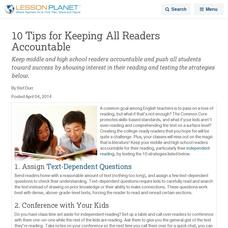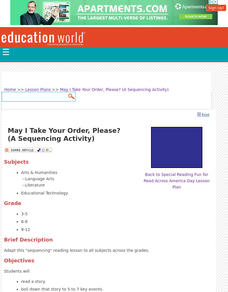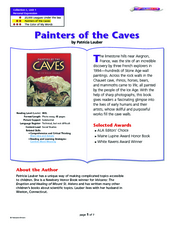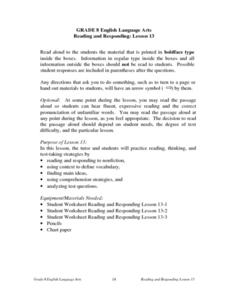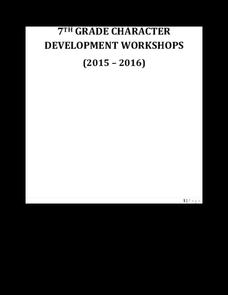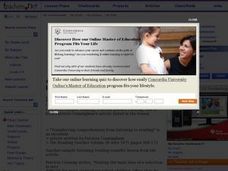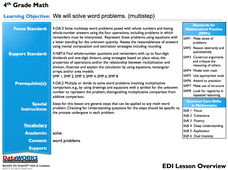Curated OER
Jigsaw Reading Keeps Readers Accountable
Utilize the jigsaw reading strategy to keep pupils accountable and encourage cooperative learning.
Curated OER
10 Tips for Keeping All Readers Accountable
Keep middle and high school readers accountable and push all students toward success by showing interest in their reading and testing the strategies below.
Curated OER
Non-Verbal Communication
Many developmentally disabled students struggle with accurately conveying messages and interpreting those of others around them, especially when they are non-verbal. This lesson contains fun activities and exercises, such as talking with...
Curated OER
May I Take Your Order, Please?
Pupils read a story, boil down that story to 5 to 7 key events, create a sequencing quiz to go with the story and have their classmates take the quiz. They will the strategy of sequencing by reading various stories (that they are not...
Curated OER
Painter of the Caves
What a great lesson plan! Learners read a story called Painters of the Caves by Patricia Lauber which discusses Stone Age wall paintings in Avignon, France. There is a series of discussion questions, comprehension questions, and a...
Curated OER
Matthew Henson
Discuss the work of Matthew Henson, an African American who traveled to the North Pole with Robert Peary. After reading the story "Matthew Henson" by Maryann N. Weidt, learners answer questions by drawing inferences and conclusions,...
Curated OER
Roman Portfolio
Student practice decoding skills and phonological awareness. In this vocabulary development lesson, student identifies new vocabulary through word association and flash cards. Student also reads How he Chick Tricked the Fox making...
Curated OER
Poetry Shared Reading
Learners explore poetry. In this poetry lesson, students discover the qualities of good writing and the characteristics of poetry. Learners practice reading poems in different ways. Studnets also discuss the mood of the poem and the...
Curated OER
Strategies for Determining the Meaning of a Word
What does that word mean? I can sound it out, but it just doesn't make sense. Teach your class a sure fire strategy to combat those pesky unknown words. You'll introduce the concept of context clues through metacognitive modeling,...
Curated OER
Building a Case for Clues
Here's a strategy that can be used with any narrative, whether read by the instructor or as independent reading. At the end of each chapter, learners predict, using prior knowledge as clues, what will happen in the next chapter. Readers...
Curated OER
Comprehension! The Key That Opens our Minds
Young scholars examine the comprehension strategy of story-grammar. They discuss the strategy and read a variety of texts. Students practice using the story-grammar strategy while reading passages from the texts. They answer questions...
Curated OER
Reading and Responding -- Lesson 13
Fourth graders work independently or in a small group to (1) read a fictional passage, (2) use context to define unfamiliar vocabulary, (3) use comprehension strategies, and (4) make inferences. Reading passage and teacher script is...
Sacramento Country Day School
7th Grade Character Development Workshops
Be proactive. Begin with the end in mind. Synergize. These are just a few strategies outlined in Sean Covey's ground-breaking best-seller, The 7 Habits of Highly Effective Teens. With a series of five character development workshops...
Curated OER
Guided Reading: Main Idea
Readers are presented with a list of three questions and asked to actively listen to a story or article to answer them. They verbally answer the questions to learn the strategy. Next, read a story to them or have them silently read a...
Lesson Plansos
Guided Reading Activities with Pizzazz
Get the most out of your guided reading lessons with this collection of literacy materials. Offering a system for using color-coded tags to mark pages while reading books, as well as an assortment of comprehension and grammar worksheets,...
DataWorks
4th Grade Math: Multi-Step Word Problems
Solving word problems requires reading comprehension and math computation. Through an interactive slideshow presentation, fourth graders observe and follow each step toward solve multiplication and division word problems.
K12 Reader
Community Connections
Who helps our community run smoothly? Read a short passage about community members and helpers. After kids finish the passage, they answer five short questions on the other side of the page.
K5 Learning
Rocks
Five short answer questions follow an informational reading passage that details the three different types of rocks—sedimentary, igneous, metamorphic—and their rock cycle.
K5 Learning
Why Does the Ocean have Waves?
Six short answer questions challenge scholars to show what they know after reading an informational text that examines waves—what they are, what causes them, and how different Earth factors affect their size and strength.
Bantam Books
The Tempest: Think-Aloud Annotation
It can be difficult to refer back to a text when analyzing it, so annotation is a great tool for kids to track what they are reading. A thorough and well-organized lesson guides learners through the process of annotating William...
Novelinks
Zach’s Lie: Magic Squares
Individuals match vocabulary words within a magic square, a concept that ties in nicely with math class. The words are all located in Zach's Lie and were specifically selected to increase comprehension of the text. Fifth in a series of...
CPO Science
Science Worksheets
If you need an array of worksheets to augment your science lessons, peruse a collection of assignments that is sure to fit your needs. With topics such as metric conversion, the scientific method, textbook features, research skills,...
Core Knowledge Foundation
Columbus and the Pilgrims Tell It Again!™ Read-Aloud Anthology
A read-aloud anthology focuses on Columbus and the pilgrims. Young scholars listen to several stories covering Christopher Columbus, the Mayflower, Plymouth Rock, pilgrims, meeting Native Americans, and the first Thanksgiving. Nine...
K12 Reader
What Do You See? (Inferences)
Making inferences is a skill that goes beyond the comprehension of written text. In this simple exercise, young learners are provided with a photograph and asked to answer a series of inference questions using only on the information...



